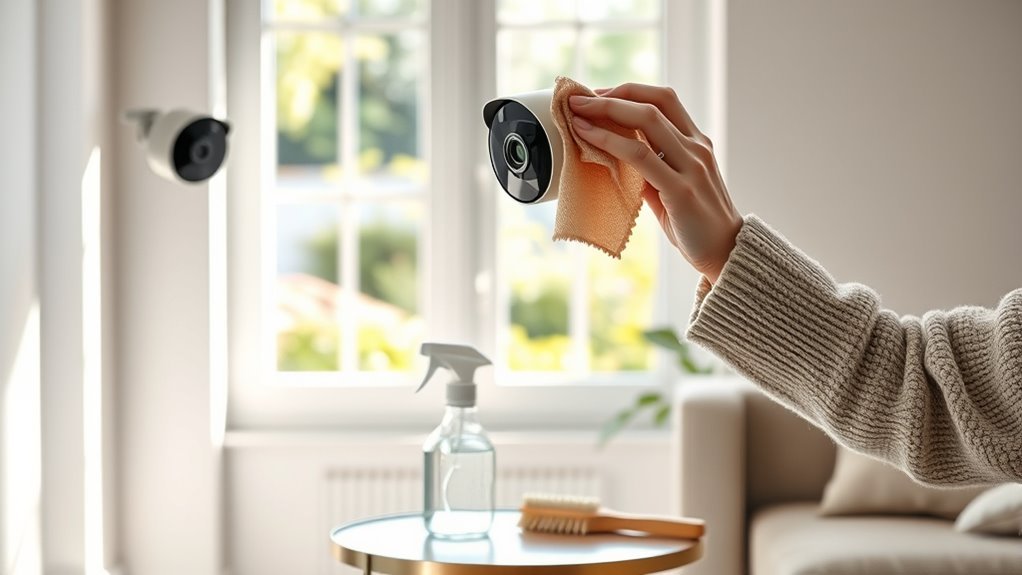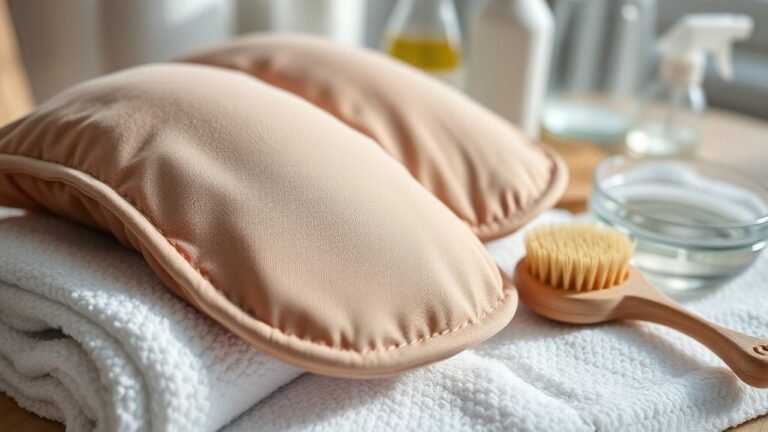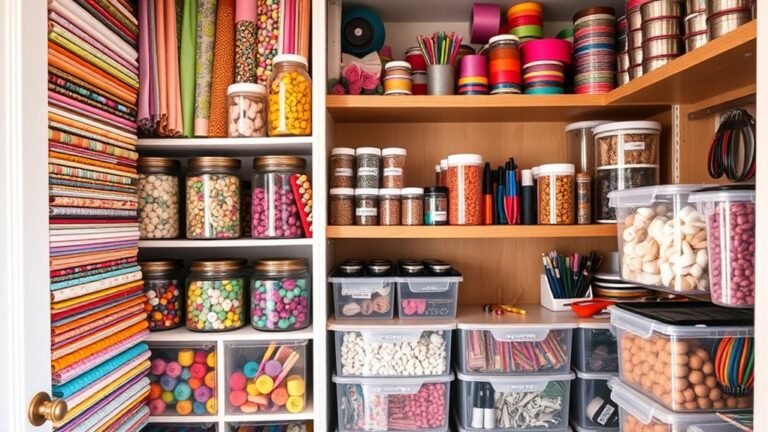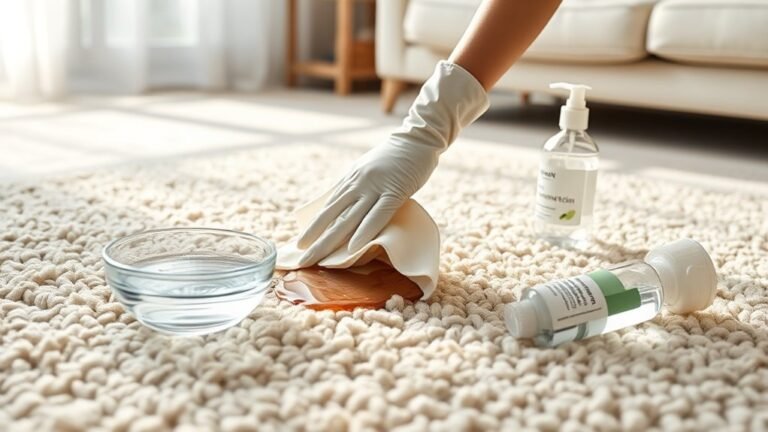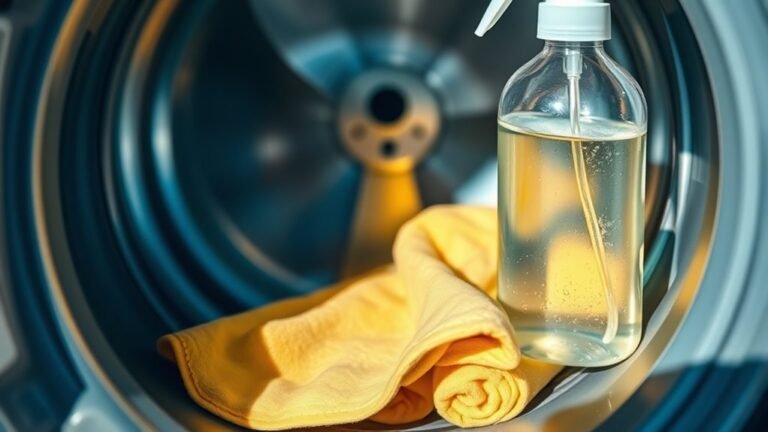How to Clean a Home Security Camera System
To clean your home security camera system, first power down the cameras to avoid damage. Use a microfiber cloth and gentle, alcohol-based cleaner to carefully wipe the lenses and sensors. Dust off the housing with a soft brush or compressed air, and check mounts for stability. For outdoor cameras, protect cables with waterproof tape and keep them under cover to prevent weather damage. Proper cleaning guarantees clear footage and reliable performance. If you want to optimize your system’s upkeep further, there’s more to explore.
Understanding Your Security Camera Components
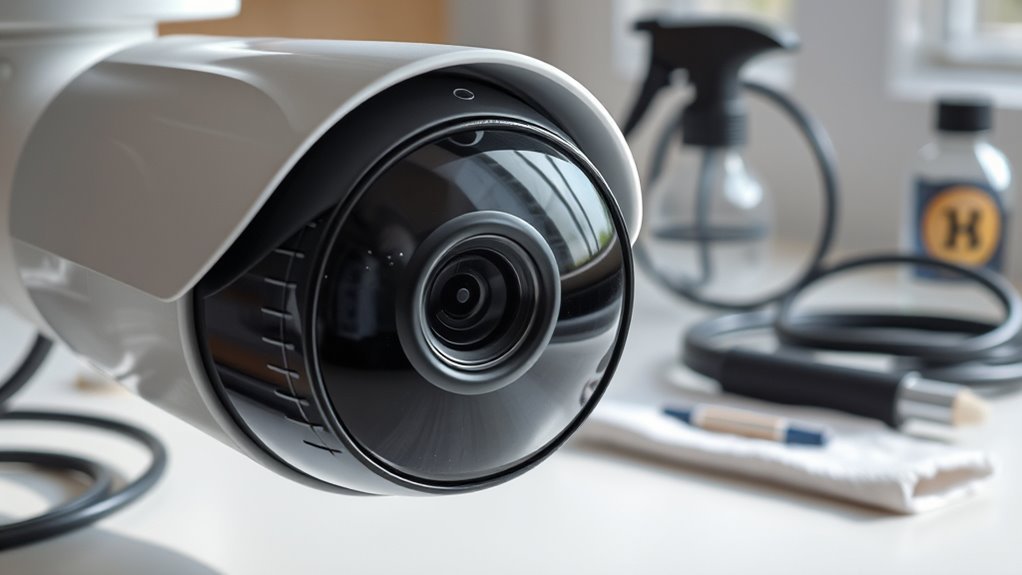
Before you start cleaning, it’s important to know the key parts of your home security camera system. Understanding camera types—like dome, bullet, or PTZ—helps you grasp how each functions and how to treat them during cleaning. Each camera has unique component functions: the lens captures video, the casing protects internal electronics, and the mounting bracket keeps it steady. Some cameras include infrared LEDs for night vision, while others have weatherproof seals for outdoor use. Knowing these parts lets you clean effectively without damaging sensitive elements. When you’re familiar with your system, you’re free to maintain it confidently, ensuring clear footage and reliable security without hassle or fear of breaking anything.
Gathering the Right Cleaning Tools
Before you start cleaning, make sure you have the right supplies like microfiber cloths and gentle cleaning agents that won’t damage your cameras. It’s important to pick safe products specifically designed for electronics to avoid any harm. Don’t forget to prepare protective gear like gloves to keep yourself safe during the process.
Essential Cleaning Supplies
To properly clean your home security camera system, you’ll need a few essential supplies that guarantee you don’t damage any components. Start with a soft microfiber cloth to gently wipe lenses without scratching. Have a small, soft-bristled brush handy for dusting hard-to-reach spots. A can of compressed air helps blow away stubborn dust from crevices. Keep cotton swabs nearby for detailed cleaning around edges. These tools support your cleaning frequency and fit perfectly into your maintenance schedule, ensuring consistent care without hassle. By having the right supplies ready, you maintain your system’s clarity and performance while preserving your freedom from complicated, time-consuming upkeep. With this simple kit, you’re set to keep your cameras clean, clear, and reliable all year round.
Choosing Safe Cleaning Agents
Although it might be tempting to use household cleaners, you’ll want to choose safe cleaning agents specifically designed for delicate electronics to avoid damaging your security camera system. Look for eco friendly solutions that won’t harm the environment or your device’s intricate components. These gentle agents maintain surface compatibility, ensuring lenses and casing aren’t scratched or corroded. Avoid harsh chemicals like ammonia or bleach, as they can degrade plastic and affect image quality. Instead, opt for mild, alcohol-based cleaners or specialized wipes made for electronics. By selecting the right products, you preserve your system’s performance and longevity while aligning with your values of freedom and responsibility. Choosing safe cleaning agents means you can maintain your security system confidently, protecting both your home and the planet.
Preparing Protective Gear
Choosing the right cleaning agents is only part of the process; you’ll also need the proper tools to apply them safely and effectively. Protecting yourself while cleaning your home security camera system is vital, so gathering essential gear is a smart move. Before you start, make certain you have:
- Protective gloves to shield your hands from harsh chemicals
- Safety goggles to protect your eyes from splashes
- Soft microfiber cloths for gentle, scratch-free cleaning
- A small, soft-bristle brush to reach tight spots
With these tools, you can clean confidently without risking injury or damaging your equipment. Preparing this gear guarantees your freedom to maintain your security system safely and efficiently, keeping both you and your home protected. Don’t skip this step—it’s key to a smooth, worry-free cleaning session.
Powering Down and Disconnecting Cameras Safely
Before you start cleaning, make certain you power down your home security cameras properly to avoid any damage or data loss. First, locate the power source for each camera—this might be a plug, battery, or PoE connection. Turn off the camera through its app or control panel if possible, then unplug the power source. This step guarantees no electrical surges or interruptions harm the system. Next, pay attention to cable management. Gently unplug cables without forcing them to prevent damage. Keep track of where each cable connects for easy reinstallation. Handling your setup with care lets you maintain your freedom to clean efficiently without risking costly repairs or data corruption. Safe disconnection is key to protecting your investment and peace of mind.
Cleaning Camera Lenses and Sensors
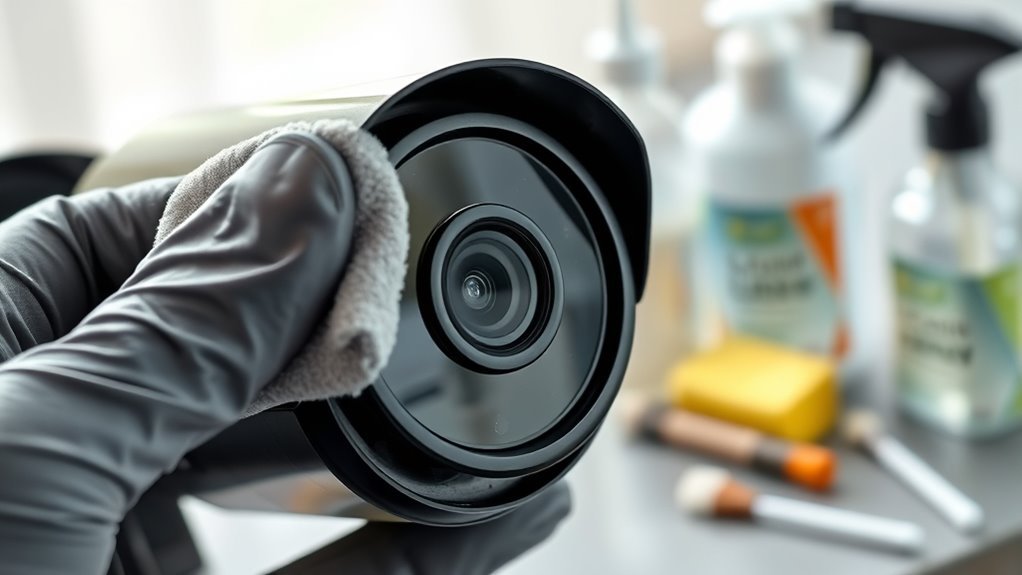
Since your camera lenses and sensors are the eyes of your security system, keeping them clean is essential for clear footage and accurate detection. Lens smudges and sensor dust can blur images or cause false alerts, so regular cleaning is a must. Here’s how to keep them spotless while maintaining your freedom to monitor safely:
- Use a microfiber cloth to gently wipe away lens smudges without scratching.
- Blow off sensor dust with compressed air or a manual air blower, avoiding harsh sprays.
- Avoid using household cleaners; opt for lens cleaning solutions designed for delicate optics.
- Handle lenses and sensors with care to prevent damage and preserve peak performance.
Maintaining Camera Housing and Mounts
You’ll want to keep the camera’s exterior clean to guarantee clear footage and prevent buildup. Check the mounts regularly to make certain they’re secure and stable. Also, take steps to protect your system from weather damage to extend its lifespan.
Cleaning Camera Exterior
Dust, dirt, and grime can quickly accumulate on your security camera’s exterior, affecting its performance and lifespan. To keep your system reliable, focus on camera surface care with these exterior maintenance tips:
- Use a soft, lint-free cloth slightly dampened with water to gently wipe the housing and lens area.
- Avoid harsh chemicals or abrasive materials that could damage the camera’s surface or protective coatings.
- Clean regularly, especially after storms or dusty weather, to prevent buildup that can obscure the lens.
- Verify all ports and seals are dry and free from debris to maintain weather resistance.
Inspecting Mount Stability
Regularly checking the stability of your security camera’s mount is crucial to guarantee it stays securely in place and functions correctly. You want the freedom to trust your system without worrying about shifts caused by wind or accidental bumps. Start by gently wiggling the mount to see if it feels loose or unstable. If there’s any movement, tighten the screws or bolts as needed to restore mount stability. Also, inspect the camera alignment to verify it’s still pointing exactly where you need it. Misaligned cameras can create blind spots, defeating your system’s purpose. Taking a few moments to inspect and adjust the mount keeps your security setup reliable and gives you peace of mind, knowing your camera is always watching exactly what it should.
Preventing Weather Damage
Although your security camera system is designed to withstand outdoor conditions, taking steps to protect its housing and mounts from weather damage will extend their lifespan and maintain performance. You want to make sure your cameras keep working no matter the weather, so consider these weatherproofing techniques and smart camera placement tips:
- Use silicone sealant around mounting points to prevent water intrusion.
- Choose shaded, sheltered spots to minimize sun and rain exposure.
- Regularly check and tighten mounts to avoid loosening from wind or temperature changes.
- Apply UV-resistant coatings on plastic housings to prevent cracking and fading.
Preventive Tips for Outdoor Camera Care
Because outdoor cameras face harsh weather and environmental factors, you’ll want to take specific steps to protect and maintain them. Start by choosing the right camera placement—install them under eaves or covered areas to shield from rain and direct sunlight. Proper placement also helps reduce dirt buildup and potential damage. Next, use weatherproofing techniques like sealing cables with waterproof tape and applying protective covers to vulnerable spots. These simple measures prevent moisture intrusion and extend your camera’s lifespan. Regularly check for loose connections or cracks, ensuring everything stays sealed tight. By combining smart camera placement with effective weatherproofing techniques, you’ll keep your system performing reliably, so you can enjoy the freedom and peace of mind that comes with a well-maintained outdoor security setup.
Testing and Adjusting Cameras After Cleaning

Once you’ve cleaned your home security cameras, it’s crucial to test and adjust them to confirm they’re working properly. This step guarantees your system provides the freedom and security you expect. Start by:
- Testing functionality through your camera app or software to confirm live feed clarity.
- Checking night vision and motion detection to verify all features respond correctly.
- Adjusting angles for ideal coverage, eliminating blind spots or glare.
- Verifying that each camera’s connection is stable and recording as scheduled.
Frequently Asked Questions
Can Cleaning My Security Cameras Void the Warranty?
Did you know 60% of warranty claims get denied due to improper maintenance? When you clean your security cameras, you’ve got to be careful not to void the warranty. Warranty policies often have strict cleaning guidelines, so you should always check the manufacturer’s instructions before you start. By following those guidelines, you keep your freedom to maintain your system while ensuring your warranty stays intact—no surprises, just smooth protection.
How Often Should I Schedule Professional Maintenance for My Camera System?
You should schedule professional maintenance for your camera system about once or twice a year to keep everything running smoothly. The maintenance frequency depends on your environment—if you’re in a dusty or high-traffic area, more frequent check-ups might be necessary. Relying on professional services guarantees your system stays reliable without you having to worry, giving you the freedom to focus on what matters most while your security stays excellent.
What Are the Signs That My Camera Needs Repair Instead of Cleaning?
You’ll know it’s time for repair vs cleaning when you spot clear camera malfunction signs like blurry or frozen images, frequent disconnections, or the camera not powering on at all. If your footage looks distorted or the device fails to record, it’s more than just dirt—it needs fixing. Don’t ignore these signs; addressing them quickly keeps your freedom to monitor your space without hassle or downtime.
Are There Specific Cleaning Products to Avoid for Certain Camera Brands?
You’ll want to avoid harsh cleaning solutions that can damage your camera materials, especially if your brand uses sensitive lenses or coatings. Some manufacturers recommend only using mild soap and water or specific lens cleaners. Using alcohol or ammonia-based cleaners might harm the camera’s finish or optics. Check your camera’s manual for any brand-specific advice, so you’re free to clean safely without risking damage or voiding warranties.
Can Extreme Weather Affect the Cleaning Frequency of Outdoor Cameras?
Think of your outdoor camera as a ship braving a storm—extreme weather conditions can definitely impact how often you need to clean it. When harsh weather hits, dirt, moisture, and debris build up faster, which can shorten your camera’s longevity. To keep your freedom intact and your security sharp, you’ll want to check and clean your cameras more frequently during rough seasons, ensuring they keep performing well no matter what nature throws their way.
